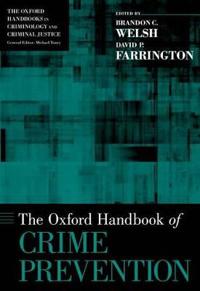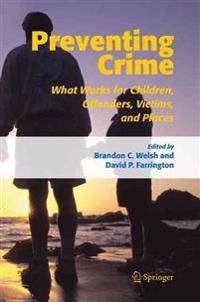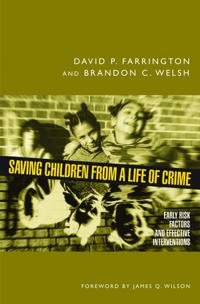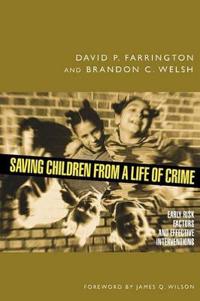Juvenile Delinquency (Pocket)
avBrandon Welsh, Larry Siegel
ISBN: 9781111353742 - UTGIVEN: 2011-07-01An analysis of the theories of delinquency, environmental issues, juvenile justice issues, and the juvenile justice system. Offering an objective presentation of juvenile delinquency theory and juvenile justice policy issues, it examines opposing sides of controversial aspects of delinquency and del[...]
The Oxford Handbook of Crime Prevention (Inbunden)
avBrandon C. (EDT) Welsh, David P. (EDT) Farrington, Brandon C. (EDT) Welsh
ISBN: 9780195398823 - UTGIVEN: 2012-03How can a society prevent-not deter, not punish-but prevent crime? Criminal justice prevention, commonly called crime control, aims to prevent crime after an initial offence has been commited through anything from an arrest to a death penalty sentence. These traditional means have been frequently e[...]
Preventing Crime: What Works for Children, Offenders, Victims and Places (Inbunden)
avB. C. Welsh, Brandon C. Welsh, David P. Farrington
ISBN: 9781402042430 - UTGIVEN: 200512Crime prevention should be rational and should be based on the best possible evidence. Decision-makers should weigh heavily any available evidence on what works best. How can a program that has produced no discernable evidence of effectiveness, as shown through numerous evaluations, be considered fo[...]
Saving Children from a Life of Crime (Inbunden)
avDavid P. Farrington, Brandon C. Welsh
ISBN: 9780195304091 - UTGIVEN: 200612After decades of rigorous study in the United States and across the Western world, a great deal is known about the early risk factors for offending. High impulsiveness, low attainment, criminal parents, parental conflict, and growing up in a deprived, high-crime neighborhood are among the most impor[...]
Saving Children from a Life of Crime (Häftad)
avDavid P. Farrington, Brandon C. Welsh
ISBN: 9780195378993 - UTGIVEN: 200810After decades of rigorous study in the United States and across the Western world, a great deal is known about the early risk factors for offending. High impulsiveness, low attainment, criminal parents, parental conflict, and growing up in a deprived, high-crime neighborhood are among the most impor[...]
What Works in Preventing Crime?: Systematic Reviews of Experimental and Quasi-Experimental Research (Inbunden)
avDavid P. Farrington, Brandon C. Welsh
ISBN: 9780761925682 - UTGIVEN: 2001-11Crime prevention is necessary in any society. Without it, crime would continue to skyrocket and the society as a whole would suffer. This special volume of The Annals, "What Works in Preventing Crime? Systematic Reviews of Experimental and Quasi-Experimental Research," originated with the 2001 Jerry[...]








